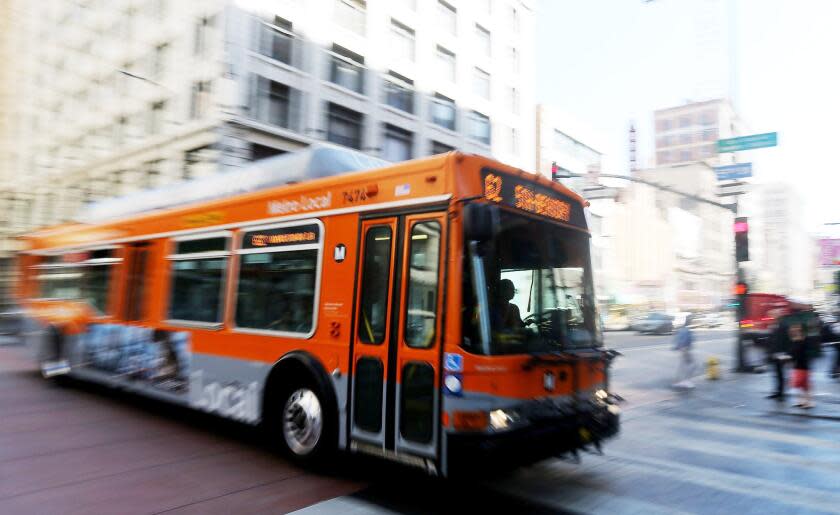Metro declares emergency over attacks on bus operators

The stabbing of a bus driver in Willowbrook this month amid a spate of increasingly violent assaults on public transit operators prompted transit officials this week to declare an emergency to speed up the building of enclosed protective barriers for drivers.
"These incidents have occurred with no prompting or warning and have created an environment of increased risk and trauma as assailants are resorting to the use of deadly weapon such as guns and knives," Los Angeles County Metropolitan Transportation Authority senior officials wrote in a report to the agency's board this week, asking it to approve the new barriers. "Given this crisis situation, it is imperative that Metro retrofit all buses with fully enclosed barriers."
The move comes as Metro is dealing with renewed concern about security across its system. On Monday, a suspect, who had previously attacked a Metro passenger, was arrested on suspicion of slitting the throat of a 66-year-old Nicaraguan immigrant, killing the grandmother as she was coming home from her night shift on a Metro train. The homicide is the second on the system this year.
The "emergency condition" allows Metro to bypass regular procurement policy in order to buy tempered glass that had been limited by supply chain disruptions. The glass and kits will be used to build enclosed barriers that will separate drivers from their passengers. The Metro's executive board is expected to vote on the proposal Thursday .
"Crime is spiraling up and we have to do something," said John Ellis, who represents six union locals that account for 5,000 bus and rail operators working at the MTA. He said lately the union has been fielding calls from riders, in addition to members. "The people that are going to work, those that don't have transportation, they are calling me just concerned for their safety."
Assaults on transit workers have tripled over the last 15 years, according to research from the Urban Institute, and other agencies are also looking at similar protections. If approved by the board, the emergency authorization would make Metro the first agency in the nation to install fully enclosed barriers on its fleet. Routes with the more documented assaults would get barriers first, but the entire fleet of more than 2,000 could be modified by the end of the year.
"This will help make drivers more safe," said Ellis, who has been working with the Metro chief executive for more than a year on this and last week gave his approval to the final prototype.
The rise in attacks over the last several years has prompted Metro to place emergency buttons in buses, train drivers in de-escalation techniques and add on-bus cameras. Two years ago, less protective barriers were placed on buses, but attackers often reached over them. In the most recent stabbing two weeks ago, the attacker was able to punch the driver and stab him in the chest. Ellis said video showed the attacker grabbed the barrier.
L.A. bus drivers have gotten guns pulled on them and been spit on, and last month one was hijacked with an airsoft gun. Across the country, union officials say transit agencies aren't doing enough, and have called for more armed protection on buses and felony-level charges for those arrested.
"It's sad because the patrons have to ride it," Ellis said. "Our riding public, they are vulnerable. You can't put an enclosure on every seat and put them in a box."
Ellis wants Metro to have its own dedicated police service, an idea that is being considered within the agency.
"It would create better safety on this system, when you have dedicated police taking care of nothing but transit," he said.
This story originally appeared in Los Angeles Times.


